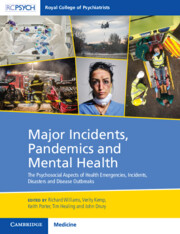 Major Incidents, Pandemics and Mental Health
Major Incidents, Pandemics and Mental Health Lessons from Civilian Practice and Military Deployments
from Section 2 - Clinical Aspects of Traumatic Injuries, Epidemics, and Pandemics
Published online by Cambridge University Press: 11 January 2024
The survival rate of 90% among wounded UK troops in Afghanistan (2004–2014) was the highest in the history of warfare. Foremost among these were severely disabled amputees, who emerged as an unexpected cohort of survivors of critical injuries. Soldiers who would have died from injuries in earlier wars were kept alive thanks to fellow soldiers highly trained in trauma medicine, paramedics who accompanied the helicopters, and the trauma care that the troops later received in hospital. We discuss our UK experience of learning from warfare, what made a difference, and how new knowledge could be used to improve physical injury and mental health related to trauma care in the UK. For the sake and sacrifice of our fallen and injured soldiers and for the benefit of our future NHS patients, an obligation rests with the NHS to allow the lessons learned from past conflicts to benefit the injured of the future.
To save this book to your Kindle, first ensure no-reply@cambridge.org is added to your Approved Personal Document E-mail List under your Personal Document Settings on the Manage Your Content and Devices page of your Amazon account. Then enter the ‘name’ part of your Kindle email address below. Find out more about saving to your Kindle.
Note you can select to save to either the @free.kindle.com or @kindle.com variations. ‘@free.kindle.com’ emails are free but can only be saved to your device when it is connected to wi-fi. ‘@kindle.com’ emails can be delivered even when you are not connected to wi-fi, but note that service fees apply.
Find out more about the Kindle Personal Document Service.
To save content items to your account, please confirm that you agree to abide by our usage policies. If this is the first time you use this feature, you will be asked to authorise Cambridge Core to connect with your account. Find out more about saving content to Dropbox.
To save content items to your account, please confirm that you agree to abide by our usage policies. If this is the first time you use this feature, you will be asked to authorise Cambridge Core to connect with your account. Find out more about saving content to Google Drive.